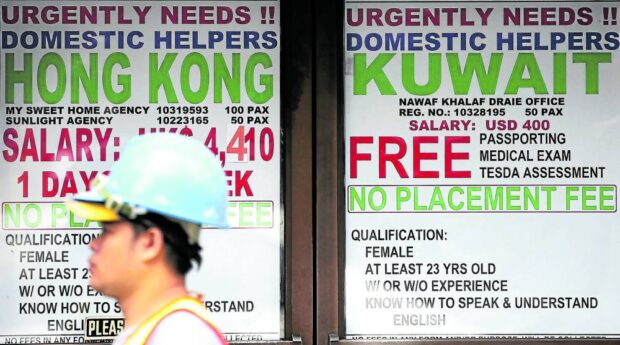Long-term solution needed for abuses vs OFWs – Migrante

JOBS ABROAD | In this photo taken in 2018, advertisements for job openings in Kuwait and Hong Kong are posted by placement agencies in Manila for Filipinos seeking employment abroad. (File photo by MARIANNE BERMUDEZ / Philippine Daily Inquirer)
MANILA, Philippines — Migrante Philippines, a migrants’ rights group, has urged the government to seek a long-term solution to the abuses committed against Filipino domestic helpers in Kuwait, noting that the temporary deployment ban it imposed in February following the rape and murder of Jullebee Ranara has not led to an improvement in their working conditions.
Migrante Philippines chair Arman Hernando said in a statement on Monday that the government should eventually stop sending household workers to countries that practice “kafala,” which has been likened to modern slavery.
But he admitted that a total deployment ban was not feasible immediately with tens of thousands of overseas Filipino workers (OFWs) in Kuwait and thousands more waiting to be deployed.
“A deployment ban or entry ban is not the answer to protect our OFWs,” Hernando said. “Our OFWs are being treated like ping-pong balls by the two governments to gain the upper hand. They are both using our OFWs as bargaining chips in the negotiation,” he added.
“Even if there is a bilateral labor agreement, the abuses against OFWs, especially domestic workers continue because [the agreement] is far from international standards on labor and migrant rights,” Migrante said.
The problem, it added, lies with the kafala system where “OFWs, especially domestic workers are not treated as workers but as slaves.”
Practiced in some Gulf countries, the system requires migrant workers, mainly household and construction workers, to have a sponsor in the host country before getting a visa and worker’s permit. It prevents them from traveling or switching sponsorships without their employer’s consent, leaving some prone to abuses.
Kuwait’s recent suspension of entry visas affecting some 800 newly hired Filipino workers was apparently in response to the government’s deployment ban, a Department of Foreign Affairs (DFA) official reiterated to the House Committee on Overseas Workers Affairs on Monday.
PH sends delegation
Foreign Undersecretary for Migrant Workers Affairs Eduardo de Vega also said that a Filipino delegation was expected to arrive in Kuwait by Tuesday to talk to officials there and possibly arrive at a compromise.
“Obviously this is [their] response, a message sent by Kuwait that they want us to lift the ban as soon as possible,” De Vega said, referring to the Department of Migrant Workers’ (DMW) suspension of the deployment of Filipino household workers in February after Ranara was raped and murdered, allegedly by her employer’s son, and her body dumped in the desert.
The Filipino delegation arriving in Kuwait includes Assistant Secretary of Middle East and African Affairs Mardomel Melicor and Ariel Javier, both of the DFA; Assistant Secretary for Migrant Workers Welfare Services Felicitas Bay and Assistant Secretary for Public Policy and International Cooperation Mario Zinampan, both of the DMW; and Overseas Workers Welfare Administration head Arnell Ignacio.
De Vega said the deployment ban to Kuwait was not permanent and merely imposed to “give us the opportunity to meet with Kuwaitis to improve conditions there [for OFWs].”“We’ll always resolve things through diplomacy but not at the expense of national pride and honor. After all, it involves the safety and welfare of our countrymen,” he said, adding that the country could not just concede. “We have to come up with diplomatic solutions in protecting the integrity of our workers,” De Vega stressed.
Shelters
As for the operation of shelters for runaway OFWs—initially believed to be the reason behind Kuwait’s move—he said this was nonnegotiable, in addition to securing justice for Ranara and improving conditions for migrant workers in Kuwait. He also sought a faster process for the issuance of exit visas for Filipinos who wish to return to the Philippines.
According to De Vega, there were currently 466 runaway workers in Kuwait staying in shelters set up by the DMW and the DFA.
“We have shelters for runaway household workers, runaway Filipino workers who have nowhere else to go. And instead of ending up in jail, we give them a place, a shelter, while we wait for their repatriation. It’s our obligation under the law to do that,” he said at a separate briefing on state television.
For the Kuwaitis, however, the shelters were a violation of their regulations.
“[They say] we urge [and] give encouragement to Filipinos to [escape] from their employers. But no, that’s not the reason why we have shelters. It is for the protection of our workers, and we will explain this [through] our team that will be going there,” De Vega said.